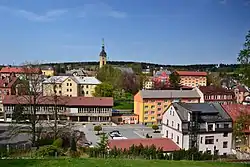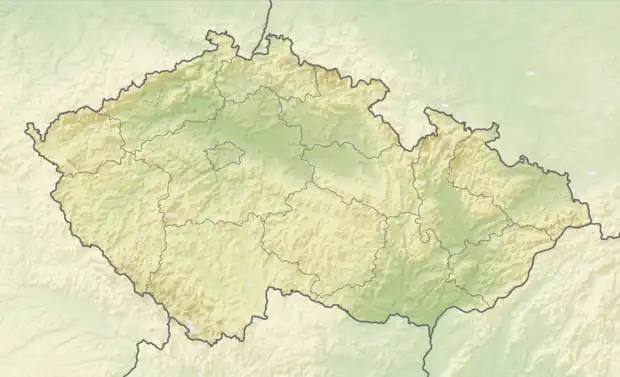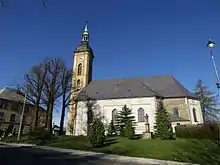Vejprty
Vejprty (Czech pronunciation: [ˈvɛjpr̩tɪ]; German: Weipert) is a town in Chomutov District in the Ústí nad Labem Region of the Czech Republic. It has about 2,800 inhabitants. It lies along the border with Germany. Until World War II, it was a large town.
Vejprty | |
|---|---|
 Centre of the town | |
 Flag  Coat of arms | |
 Vejprty Location in the Czech Republic | |
| Coordinates: 50°29′30″N 13°1′58″E | |
| Country | |
| Region | Ústí nad Labem |
| District | Chomutov |
| First mentioned | 1506 |
| Government | |
| • Mayor | Jitka Gavdunová (ODS) |
| Area | |
| • Total | 9.77 km2 (3.77 sq mi) |
| Elevation | 725 m (2,379 ft) |
| Population (2023-01-01)[1] | |
| • Total | 2,793 |
| • Density | 290/km2 (740/sq mi) |
| Time zone | UTC+1 (CET) |
| • Summer (DST) | UTC+2 (CEST) |
| Postal code | 431 91 |
| Website | www |
Administrative parts
Villages of České Hamry and Výsada are administrative parts of Vejprty.
Geography
Vejprty is located about 26 km (16 mi) west of Chomutov and 30 km (19 mi) southeast of Karlovy Vary. It lies in the Ore Mountains. The highest point is below the top of the mountain Vlčí kopec, at 970 m (3,180 ft) above sea level. The territory stretches along the border with Germany, from which it is separated by the Polana stream. It borders the German municipalities of Bärenstein and Oberwiesenthal.
History
The first written mention of Vejprty is from 1506. In 1550, silver ore was discovered in the area. The mining settlement of Neugeschrei was established near the newly created adit, today the local part of Vejprty under the name Nové Zvolání. In 1607, Emperor Rudolf II allowed all the miners and craftsmen settled here to deal freely with their property. Vejprty was promoted to a royal mining town in 1617.[2]
Vejprty was badly damaged during the Thirty Years' War by the army of Johan Banér, and the mines were flooded. In 1688, mining was resumed and the town began to flourish again. In the first half of the 18th century, however, profitability began to decline, and mining stopped in 1751. Although mining resumed briefly in the 19th century, it ended for good in 1845. The livelihood of the inhabitants was thus gradually reoriented to the manufacture of rifles and to lacemaking. Rapid development took place in the second half of the 19th century. It was helped by the establishment of the Chomutov–Vejprty railway, which was put into operation in 1872.[2]
Demographics
|
|
| ||||||||||||||||||||||||||||||||||||||||||||||||||||||
| Source: Censuses[3][4] | ||||||||||||||||||||||||||||||||||||||||||||||||||||||||
Sights

The most important monument is the Church of All Saints. The original church was built in 1660. In 1777–1785, it was rebuilt in Rococo style. The church tower was rebuilt after a fire caused by lightning in 1827, and in 1912 it was raised to a height of 53 metres (174 ft).[5]
A valuable building is the Chapel of Saint Martin. It dates from the 16th century, when it replaced an old wooden church.[6]
Notable people
- Ottokar Tumlirz (1856–1928), Austrian physicist
- Theodor Innitzer (1875–1955), cardinal and Archbishop of Vienna
- Wilhelm Dick (1897–1980), German ski jumper
- Viktor Petermann (1916–2001), German Luftwaffe fighter ace
- Walter W. Müller (born 1933), German academic
Twin towns – sister cities
 Bärenstein, Germany
Bärenstein, Germany
Vejprty also cooperates with Gunzenhausen, Germany.[7]
Gallery
 Town square
Town square Chapel of Saint Martin
Chapel of Saint Martin Vejprty in 1912
Vejprty in 1912
References
- "Population of Municipalities – 1 January 2023". Czech Statistical Office. 2023-05-23.
- "Historie" (in Czech). Město Vejprty. Retrieved 2022-09-14.
- "Historický lexikon obcí České republiky 1869–2011 – Okres Chomutov" (in Czech). Czech Statistical Office. 2015-12-21. pp. 13–14.
- "Population Census 2021: Population by sex". Public Database. Czech Statistical Office. 2021-03-27.
- "Kostel Všech svatých" (in Czech). National Heritage Institute. Retrieved 2023-06-07.
- "Hřbitovní kaple sv. Martina s náhrobníkem" (in Czech). National Heritage Institute. Retrieved 2023-06-07.
- "Partnerská města" (in Czech). Město Vejprty. Retrieved 2020-08-15.